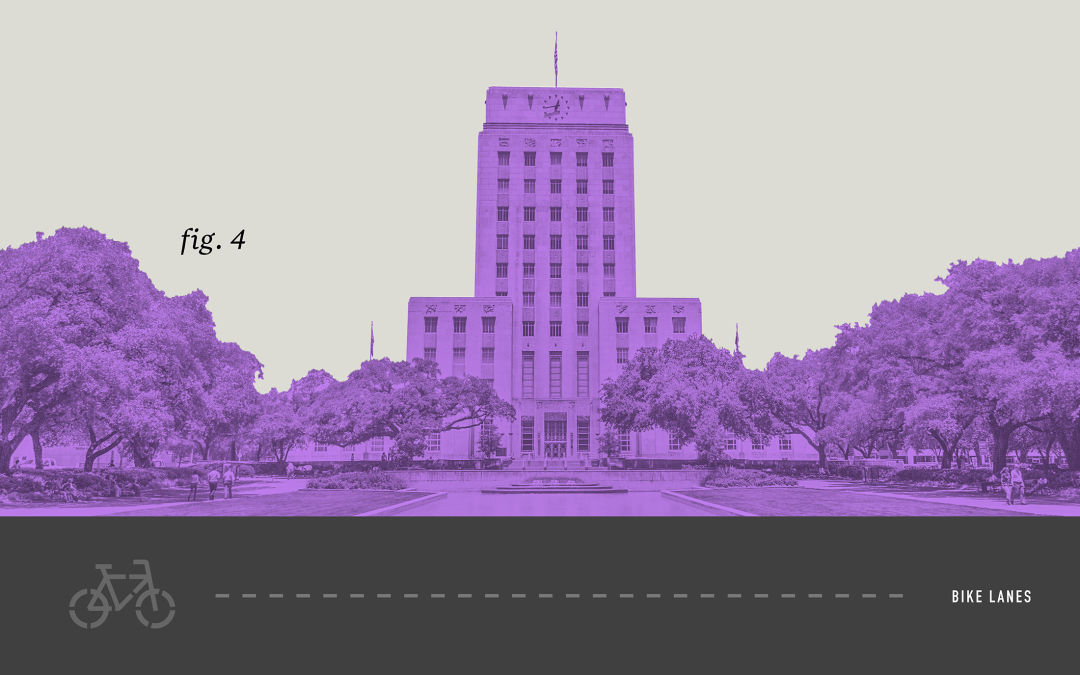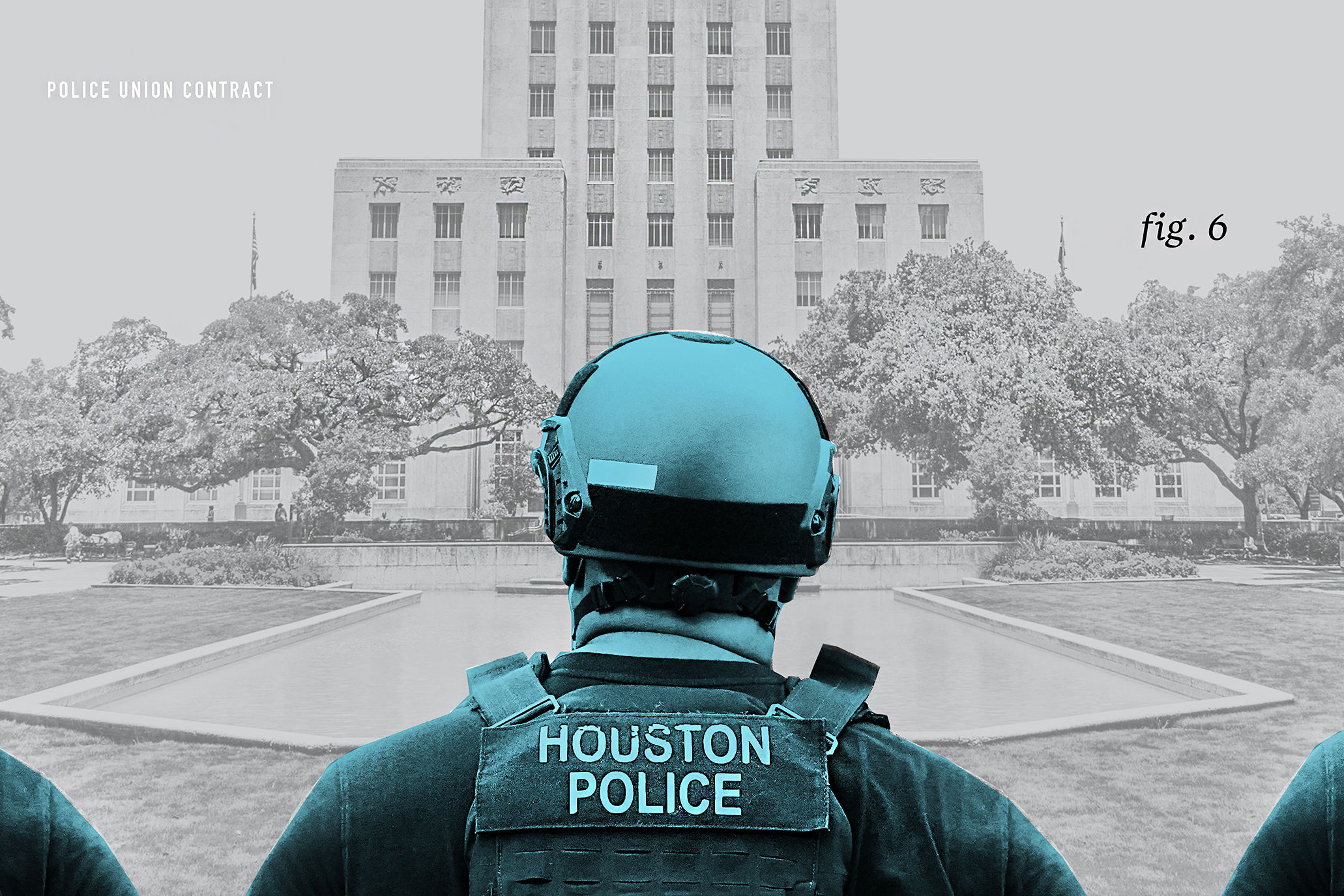What You Missed at Houston City Council This Month

Emily Hynds, known locally as “she who takes notes,” has been independently covering Houston City Council meetings since June 2020. In her monthly Houstonia column, she shares all the juicy intel about what’s going on at city hall. Want to check the meetings out for yourself? Read this companion guide.
In this month’s dispatch: The mayor goes after bike lanes, police and fire department overtime cause budget strain, and a new short-term rental ordinance.
Bike lane controversy
The unannounced removal of the protected bike lanes on Austin Street caused extra engagement at city council. Around 40 people showed up to talk about it at the public comment session on April 1, and have continued to show up at subsequent meetings. On April 9, councilmember Abbie Kamin tagged an item that would have approved $12,000 for armadillos, the small concrete slugs used to protect bike lanes. Kamin remarked on the removal of armadillos on Heights Boulevard, which she said happened without notice or public input.
“One of the reasons I was given,” she said, “was that the armadillos are not safe for vehicular traffic and that if one is removed, they create an issue. So, they were just going to rip them up altogether.”
The councilmember reiterated that she supports protective barriers for bike lanes but wanted clarification on policy before voting. The item came up again for a vote on April 16 and passed with no discussion.
Debate on overtime expense
Controller Chris Hollins and finance director Melissa Dubowski continue to project different end balances for the general fund, which is basically the city’s savings account in which it’s legally required to have a certain level of cash in reserve. The city’s fiscal year ends in June, which is why this is all relevant.
At the April 2 meeting, Hollins clashed with Mayor John Whitmire and Dubowski when he highlighted what he called excessive overtime expenses, particularly from the police, fire, and solid waste departments. The mayor and finance director downplayed the issue, but Hollins said, “If you're not alarmed by these overtime figures, we got a real problem.”
An end to the drainage lawsuit, finally
The mayor has been teasing about drainage lawsuit negotiations for months, and he finally revealed the result on April 16. Voters approved a charter amendment in 2010 requiring a certain amount of ad valorem (or according to value) tax be put into the Dedicated Drainage and Street Renewal Fund (DDSRF), but two residents sued the city in 2019 for not following through, and the case has been in the courts ever since. Whitmire negotiated a deal with the plaintiffs, so rather than a sharp increase, the city will instead gradually increase its contribution to the fund over time. It will start with $16 million this fiscal year, then $48 million next year, and the full amount by 2028.
Whitmire said resolving the drainage lawsuit will address budget shortfalls, fulfill campaign promises, and put “hundreds of millions” into repairing infrastructure. The plaintiffs thanked the mayor for approaching them about reaching a resolution, which they say the previous administration was unwilling to do.
Councilmembers Amy Peck and Edward Pollard criticized the city’s capacity to use all of the money in the DDSRF. Peck said there is usually money left over in the DDSRF, despite “shovel-ready” projects in the queue. Pollard said there aren’t even enough workers available for all of the plans on the city’s agenda.
A new Montrose TIRZ budget
On March 26, councilmember Kamin delayed the approval of the Montrose TIRZ budget, citing concerns about significant budget discrepancies and questions about scope. For instance, the budget included $11.5 million for the decommissioned Freed-Montrose Library. The budget was approved at the April 2 meeting. Kamin reported the TIRZ plans to meet on April 21 to work on the budget, which will include “some very exciting additions that will support the greater community overall.” No details on what those are, yet.
A short-term rental ordinance
On April 16, city council created a short-term rental ordinance. People operating short-term rentals like Airbnbs or VRBOs will need to pay a $250 registration fee and take a free online human trafficking training. The city will also have some discretion about when to revoke permits based on violations. There has been chatter about this ordinance at council meetings for weeks, with tedious (and yes, important) debate and discussion on amendments.
The ordinance is official but also brand-new, so it’s important to remember that it can be revised as the kinks get worked out. Council does this all the time, literally every week. There was no discussion at the meetings I watched on how short-term rentals affect housing stock, costs, or displacement. Maybe they talked about that when it was aired at the Quality of Life committee?
Coming up
The city itself doesn’t produce a budget-related survey, but councilmember Sallie Alcorn does and it’s now live. Go fill it out so officials know what you want prioritized. The budget workshop calendar has been published and I highly encourage you to take a look at it and dig into the topics that interest you. There are also a couple of budget-focused town halls outside of that schedule to try and capture all the community input possible.
Budget season can be a drag and I often joke about feeling dread when it starts getting mentioned, but in reality, it’s an exciting time when council makes big decisions that affect our daily lives. I’m going to be as involved as I can, and I will take notes on it all to share with you next month. Houston City Council meetings take place almost every week on Tuesdays and Wednesdays at 901 Bagby Street or online via HTV.




